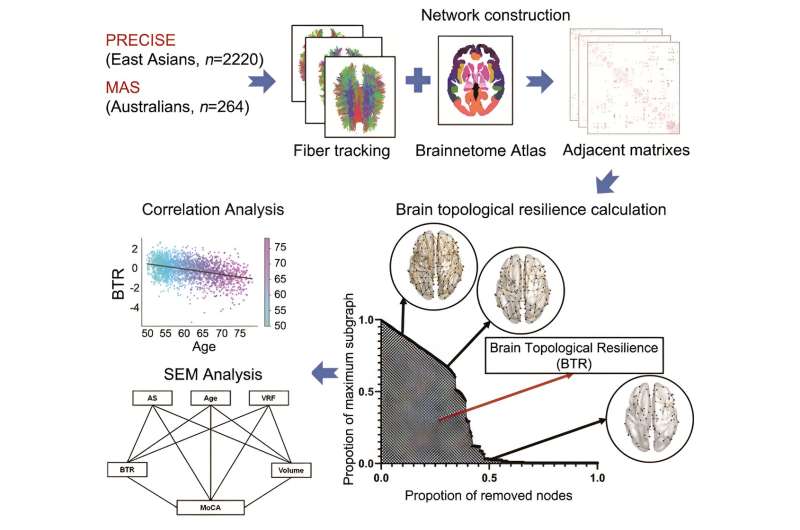This article has been reviewed according to Science X's editorial process and policies. Editors have highlighted the following attributes while ensuring the content's credibility:
fact-checked
trusted source
proofread
Aging and vascular risk: Scientists explore link between brain topological resilience and cognitive performance

Existing research indicates that cognitive impairment in late life is the result of a sequence of life-long events, with vascular risk factors playing a crucial role in this process. It is important to develop biomarkers that can detect the early effect of vascular risk factors on the brain.
Brain connectomes introduce integrated-perspective-based measures to quantify and analyze cerebral changes, thereby providing potential biomarkers. However, currently, there is no large-sized, cross-racial database analysis in this field.
A study published in the journal Science Bulletin investigated the relationship between brain topological resilience (BTR), aging, vascular risk factors, atherosclerosis, and cognition in middle-aged and older adults. Two independent, multi-ethnic, community-based cohorts were utilized in this study: the PolyvasculaR Evaluation for Cognitive Impairment and Vascular Events (PRECISE) database and the MAS database.
Brain structural networks were constructed based on the Brainetome template and diffusion-weighted imaging (DWI) data. A combination of k-shell decomposition and node degree centrality was employed to determine the order of targeted attack nodes. The obtained BTR values were then analyzed to determine associations with age, vascular risk factors (VRF), atherosclerosis (AS), and cognition. Structural equation modeling (SEM) was used to assess the directed relationships among these variables.
In the PRECISE cohort, BTR exhibited a negative correlation with age (R = -0.342, P -16) and a positive correlation with cognition (measured by MoCA scores, R = 0.174, P = 2.22×10-16). This outcome was also validated in the MAS cohort, where it was negatively correlated with age (R = -0.173, P = 0.003) and positively correlated with global cognition scores (R = 0.258, P = 2.74×10-5) and MMSE (R = 0.185, P = 0.003). Significant and negative correlations were found between BTR and both weighted VRF (R = -0.109, P = 2.51×10-7) and AS scores (R = -0.131, P = 6.25×10-10) in the PRECISE cohort. In the MAS cohort, there was a negative correlation between BTR and weighted VRF scores (R = -0.187, P = 0.004).
Results of SEM analyses showed that the controlling effect of volume, the pathways from age (standardized Β = -0.255, FDR-corrected P -16), weighted VRF (standardized Β = -0.050, FDR-corrected P = 0.031) and weighted AS (standardized Β=-0.047, FDR-corrected P = 0.042) to BTR were statistically significant. The path from BTR to MoCA score was also significant (standardized Β=0.051, FDR-corrected P = 0.039).
In summary, this study integrated neuroimaging and network science methods to propose a brain topological resilience (BTR) metric that reflects the robustness of the brain. Furthermore, this study investigated whether variables such as aging, vascular risk factors, and atherosclerosis lead to cognitive decline by affecting BTR.
SEM supported pathways in which BTR mediated the effect of aging and atherosclerosis on cognition, even after controlling for the effects of brain volume. This study suggested that BTR is a significant marker that reflects the effect of risk factors on cognition. The results indicated that combining vascular risk factors, atherosclerosis, cognitive function, and this multidisciplinary measure offers a valuable and practical measure for assessing and improving brain health.
More information: Hao Liu et al, Exploring the link between brain topological resilience and cognitive performance in the context of aging and vascular risk factors: A cross-ethnicity population-based study, Science Bulletin (2024). DOI: 10.1016/j.scib.2024.04.018




















